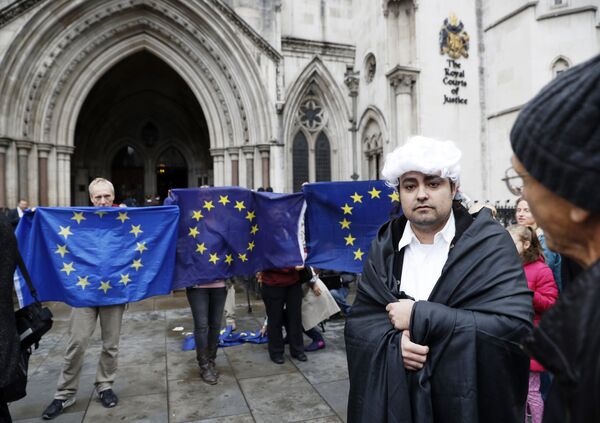Although the outcome of the referendum was clear — 52 percent voting to leave the EU, with 48 percent choosing to remain — the fallout from it is far from transparent. From the outset, many lawyers were suggesting the result of the referendum was not binding on parliament.
A letter signed by more than 1,000 lawyers, published in July 2016, stated that the referendum was only "advisory" and that "there is evidence that the referendum result was influenced by misrepresentations of fact and promises that could not be delivered."
Meanwhile, businesswoman Gina Miller and others engaged lawyers to take a case to the high court arguing that the Prime Minister, Theresa May, and her government did not have the authority to trigger Article 50 of the Treaty of Lisbon — the process of actually leaving the EU — without the consent of parliament.
The question, in law, centers on what is known as the "Royal Prerogative" (also referred to as the Crown Prerogative): the ancient power vested in the king or queen to make unilateral decisions over his/her parliament. It dates back centuries to when England was ruled by Kings and Queens who had total power over their people and there was no parliament as we know it today.

As time went by, more powers were devolved to parliament and Queen Elizabeth II today holds a largely formal, non-executive position. The prerogative — royal, crown or otherwise — is now exercised by her prime minister — Theresa May — or her ministers — technically, in this case, David Davis, the Secretary of State for Exiting the European Union.
The case went to the High Court, which ruled that May's Government could not use the prerogative to invoke Article 50 and that only parliament could consent such action.
Unsurprisingly, the UK Government appealed to the Supreme Court, which heard the case over four days, early December and is set to issue its judgement in mid-January.

The case against the UK Government is that the European Communities Act 1972 (ECA1972) — which was the main legislation on Britain joining what is now the EU — created statutory rights that only parliament may revoke or amend.
The UK Government's argument is that ECA1972 is the "conduit" by which EU treaty obligations agreed by the UK Government with other member states enter UK law. In other words, ever since the 1972 Act, successive government have made agreements and signed treaties using prerogative powers derived from that act of parliament.
The counterargument goes — as neatly summed up by one of the Supreme Court justices, Lord Mance — that:
"There is a huge difference between submitting to the rulings of a club committee as to what the club rules are (the dress code or whatever) if you happen to be a member of a club, and not being a member of the club at all — either being expelled or giving notice."
Northern Ireland, Scotland, Wales Claims
The Supreme Court has also had two cases referred from the High Court of Northern Ireland. Both cases claim that argued it would be unlawful to begin the formal process of leaving the EU without a parliamentary vote, under the terms of the 1998 Good Friday Agreement — a major part of the peace process agreed between Britain and Ireland to end decades of civil unrest in Northern Ireland.
The Welsh and Scottish Governments have also argued their cases before the Supreme Court, saying that any decision to leave the EU would be a matter of major UK constitutional importance and would have consequent effects on the devolved institutions of both Scotland and Wales. Thus, any decision on Article 50 would have to be made by the UK Parliament and not by the royal prerogative alone.
We are funded. Thank you all so much. https://t.co/6tYicAlo1f
— Jo Maugham QC (@JolyonMaugham) 11 December 2016
Ireland Case
Meanwhile, a British barrister, Jolyon Maugham QC, has brought a case before the courts in Ireland to ask whether a notification under Article 50 can be revoked and whether — by leaving the EU — the UK automatically leaves the European Economic Area.
The intention to go via Dublin is to encourage the Irish courts to make a reference to the Court of Justice of the European Union. Maugham's first question is: after all the negotiations over exiting the EU and agreeing terms on a new relationship with it, would the UK parliament be able to revoke its withdrawal under Article 50 if it does not like the terms of the 'exit'?
The second issue over the referendum question on Britain leaving "the EU." Maugham is asking whether that means the UK still remains a member — automatically — of the European Economic Area.
All these arguments are under consideration over the 2016/7 Christmas and New Year period, after which the Supreme Court justices will issue their judgements in mid-January.



